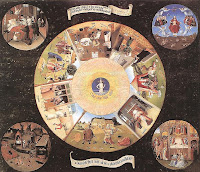We all experience, from time to time, strong negative emotions, such as anger, hatred, and envy. And we almost always feel bad about it, immediately reproach ourselves and feel guilty afterward. Rarely do we rejoice at such feelings, and if we do, we may be in danger of being put and locked away.
The problem is that when we feel negative about negative thoughts and emotions, it does not work out like mathematical equations where two negatives make a positive. It is rather like a fragmentation of the self that is at war with itself. It does not, as a result, help our cause. Feeling bad about a negative feeling perpetuates negativity. Instead of ridding yourself from the undesired feeling, you inadvertently make it worse.
So what should be done? Try this out as an experiment: Embrace your negative feelings. Appreciate them. After all, the fact that they are labeled and classified by us, society, and religion as “good” and “bad” does not preclude that they are still feelings after all. They may be opposites on the scale, but they still have the same origin.
Nevertheless, a strange thing happens inside when you stop fighting against your negative side: It slowly evaporates. Your negative side wants you to pour gasoline onto it, but when you deal with these feelings gently, they dissolve.
Just like in a heated argument, the violence escalates because of continued use of insult and injury. Should one of the participants break the chain and suddenly show a sign of true gentleness or utter a harmless absurdity, the other would be confused. The other would probably claim that you are completely out of your mind, but the conflict would most likely not terminate in a brawl.
Also, next time around, your outburst of anger may be at a decreased level. Naturally, you will probably never really eliminate negative emotions, yet at least they will be easier to control. As a swami once said, you cannot stop your thoughts from coming, but you can learn how to surf.
One of the ingrained difficulties of our own Judeo-Christian society lies in our image of sin and our complex relationship with God. In the eyes of God, we are all purported to be sinners. What a negative perspective! By chastising yourself for your sins, you will continue the vicious cycle of negativity.
Human beings are definitely no angels. Far from it. And yes, one should always strive for the good, whatever that may mean to the individual under the circumstances. Yet unfortunately, religion and religious authorities often emphasize the worst in human nature.
What about love and forgiveness? Does not God forgive our sins? Did Jesus himself not protect and give shelter to a “sinful” woman when he claimed that no one was exempt from sin?
In fact, we have a split image bequeathed by religion. God as a loving and forgiving authority and God as the punisher. I have elsewhere shown this discrepancy by comparing the ideology behind Moses and the Old Testament versus Jesus and the Gospels.
Along the same lines, I believe we would achieve much more control of our so-called sins if we actually forgave ourselves once in a while and gave us space and room to feel those negative emotions. In this case, positive thinking is a valuable tool, but it dodges the issue. If you just use positive thinking to combat negative ones, you are back to square one, meaning more thinking with more fragmentation.
Instead of feeding and fanning the flames of the beast within us or punishing ourselves for our misdeeds or supposed transgressions, we should embrace them and forgive ourselves. It does not mean nor justify that we acted in the right manner. It just means that everybody has to face the inevitable adage that nobody is perfect. But at least we continue trying.


3 comments:
This is very inspirational. I do not mean that in a good way or a bad way. I only mean, it makes me want to write a 2000 word response, which I do not have time to do at the moment. The idea that one should embrace their anger is intriguing. Embrace it, but don't let it have its way with you.
I believe that once people study and truly understand the anatomy of anger, the anger mostly dissipates and the ability to get angry because someone is mad at you also lessens. I think it should be required learning in high school.
That is what I want to comment on, and haven't the time to do. I printed out your Jesus and Moses articles for later review, as they are two characters for which I have extreme clinical interest.
Thanks for continuing to express ideas that make us think. Agree or disagree, we always marvel at the interesting perspectives you have and the things you say. I have become a huge fan of your blog.
sincerely,
J
Thank you very much, J! I very much appreciate your readership and your opinions.
One of the aims of my blog (apart from fame and fortune, of course) is to elicit both thought and discussion. I don`t mind it when people disagree because sometimes I have a hard time agreeing with myself on some of these issues!
Anyhow, I am looking forward to the 2000 word response whenever you are ready to do so.
Thanks again,
Arash
Well, I really like this despite a principled aversion to advice or the tone of a “self-help” book.
In fact when I saw your title about positive and negative thinking I was already prepared for some trite advice to think positive.
I’m glad to have found you. It’s J Myste that I have to thank.
Post a Comment